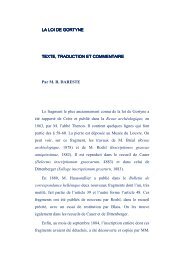CYPRIOT GRAMMAR
CYPRIOT GRAMMAR
CYPRIOT GRAMMAR
You also want an ePaper? Increase the reach of your titles
YUMPU automatically turns print PDFs into web optimized ePapers that Google loves.
Chapter 3: Nouns and Articles (2)<br />
In this chapter will be exploring how various articles and cases change the endings of masculine nouns. You shouldn’t be worried because<br />
Cypriot tries to maintain a euphony and a poetic sound which will be evident in the following tables and there examples.<br />
3.1 Masculine Nouns<br />
Let us take the masculine nouns according to their ending which helps us categorize them into different types of declensions.<br />
3.2 First Declension<br />
3.2.1 Type Α –ος<br />
_____________Article__Singular______Article____Plural<br />
Nominative_____ο_____άδρωπος_______οι______αδρώποι<br />
Accusative_____(ν)τον__άδρωπον____(ν)τους__αδρώπους<br />
Genitive_______(ν)του__αδρώπου_____(ν)των__αδρώπων<br />
Vocative_______ρε/ε___άδρωπε______ρε/ε_____αδρώποι<br />
Irregularities<br />
1. The words κατάπελλος (nutcase), ασυγχώρητος (unforgivable) do not experience a tone mark shift in the singular genetive. Eg. Του<br />
κατάπελλου.<br />
2. The word γείτος (neighbour) drops its final –ς in the Vocative. Eg. Ρε γείτο<br />
3. The word μάστρος take the form μάστρε when preceding names in the nominative. Eg. Ο μάστρε Γιώρκος<br />
4. κ/γγ + -ε/-οι -| τζ’ + ε/-οι Eg. (πχ.) Κακός -> Κατζ’οί (the evil man the evil men)<br />
5. Irregular plural ο γρόνος -> τα γρόνια (year)<br />
6. Irregular genetive plural ο λόος -> των λογιών (a reason/kind)<br />
3.2.2 Type Β –ός<br />
_____________Article__Singular______Article____Plural<br />
Nominative_____ο_____πετεινός_______οι_____πετεινοί<br />
Accusative_____(ν)τον__πετεινόν____(ν)τους__πετεινούς<br />
Genitive_______(ν)του__πετεινού_____(ν)των__πετεινών<br />
Vocative_______ρε/ε____πετεινέ_____ρε/ε_____πετεινοί<br />
Irregularities<br />
1. The words θκειός, αρφός, γιός, γαμπρός. (Uncle, brother, son, son in law) have an irregular ending in the genetive plural in order to<br />
distinguish from the plural genetive of feminine nouns.<br />
Των θκειούων, αρφούων, γιούων, γαμπρούων.<br />
Irregulars for both declensions:<br />
2. κ/γγ + -ε/-οι -> τζ’ + ε/-οι Eg. (πχ.) Τζ’υρκάκος -> Τζ’υρκάτζ’ε<br />
3. Names such as Νικολός, Τζ’υρκάκος, Γιάννος have irregular forms in the vocative. They can either simply drop the final –ς or they can<br />
take the ending –ε.<br />
Ρε Νικολό/Νικολέ<br />
Ρε Τζ’υρκάκο/ Ρε Τζ’υρκάτζ’ε<br />
Ρε Γιάννο/ Ρε Γιάννε<br />
4. Irregular plural ο πηλός -> τα πηλά (clay -> mud)<br />
3.3 Second Declension<br />
3.3.1 Type A –άς<br />
____________Article__Singular______Article____Plural<br />
Nominative_____ο_____γαλατάς_______οι______γαλατάες<br />
Accusative_____(ν)τον__γαλατάν____(ν)τους____γαλατάες<br />
Genitive_______(ν)του__γαλατά_____(ν)των____γαλατάων<br />
Vocative_______ρε/ε___γαλατά_____ρε/ε______γαλατάες<br />
Irregularities:<br />
1. The word παπάς (father) has the irregular vocative of άπα.<br />
11





